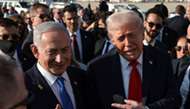Maybe a campaign is like a courtship. A candidate’s job is to woo the electorate, to win the people’s affection with charm, familiarity and compassion
Maybe a campaign is like a big version of “American Idol.” It is a contest over who is the most talented. In this mode, a candidate’s job is to endear himself to the people in the audience with likability and then wow them with his gifts.
Maybe, on the other hand, hiring a president is like hiring a plumber. Voters aren’t really looking to fall in love with the guy; they just want someone who will fix the pipes. The candidate’s job is to list the three or four things he would do if elected and then to hammer home those deliverables again and again.
You could make a case that most campaigns are a little of all three, though the proportions vary from year to year. In 2008, Obama ran an uplifting campaign that was part courtship and part “American Idol.” Richard Nixon, who lacked such charm, ran workmanlike, plumber campaigns, no pun intended.
So far, though, the 2012 presidential campaign is fitting into none of these categories. It’s being organized according to a different metaphor. This year, both organizations seem to visualize the campaign as a boxing match or a gang fight. Whichever side can hit the other side harder will somehow get awarded the champion’s belt.
So far this year, both President Obama and Mitt Romney seem more passionate about denying the other side victory than about any plank in their own agendas. Both campaigns have developed contempt for their opponent, justifying their belief that everything, then, is permitted.
In both campaigns, you can see the war-room mentality developing early. Attention spans shrink to a point. Gone is much awareness of the world outside the campaign. All focus is on the news blip of the moment — answering volley for volley. If they bring a knife, you bring a gun. If they throw a bomb, you throw two.
Both sides are extraordinarily willing to flout respectability to show that they are tough enough to bare the knuckles.
In November, the Romney campaign ran a blatantly dishonest ad in which President Obama purportedly admits that if the election is fought on the economy, he will lose. The quote was a distortion, but the effectiveness of the ad was in showing Republican professionals and primary voters that Romney was going to play by gangland rules, that he was tough enough and dishonest enough to do so, too.
Last week, the Obama campaign ran a cheap-shot ad on the death of Osama bin Laden. Part of the ad was Bill Clinton effectively talking about the decision to kill the terrorist. But, in the middle, the Obama people threw in a low-minded attack on Romney. The slam made Clinton look small, it made Obama look small, it turned a moment of genuine accomplishment into a political ploy, but it did follow the rules of gangland: At every second, attack; at every opportunity, drive a shiv between the ribs.
This martial-, gangland-style of campaigning apparently makes the people in the campaigns feel hardheaded, professional and Machiavellian. But it’s not clear that it’s actually the best way to win an election. That’s because the style is based on a series of dubious assumptions: that the harshest language is the most persuasive to voters; that what feels good to you as a competitive combatant will also look most attractive to detached onlookers; that over the duration of a six-month campaign, daily combat will continue to look compelling rather than cumulatively revolting; that in a campaign dominated by “super PAC” negativity, a presidential candidate is better served by wading into the brawl rather than separating himself from it.
The campaign-as-warfare metaphor may seem sensible to those inside the hothouse. It may make sense if you think today’s swing voters hunger for more combat, more harshness and more attack.
But it’s probably bad sociology and terrible psychology, given the general disgust with conventional politics. If I were in the campaigns, I’d want to detach from the current rules of engagement and change the nature of the campaign. If I were Obama, I’d play to his personal popularity and run an “American Idol” campaign — likability, balance, safety and talent. If I were Romney, saddled with his personal diffidence, I’d run a plumber campaign — you may not love me, but here’s four things I can do for you.
These would be very different campaigns than the ones we are seeing so far: more positive psychology, less negative psychology. A few big messages about fundamental change, less obsession with the daily news cycle. More attention devoted to those turned off by politics, less to the hard-core denizens who are obsessed by it.
스마터리빙
more [ 건강]
[ 건강]이제 혈관 건강도 챙기자!
[현대해운]우리 눈에 보이지 않기 때문에 혈관 건강을 챙기는 것은 결코 쉽지 않은데요. 여러분은 혈관 건강을 유지하기 위해 어떤 노력을 하시나요?
 [ 건강]
[ 건강]내 몸이 건강해지는 과일궁합
 [ 라이프]
[ 라이프]벌레야 물럿거라! 천연 해충제 만들기
 [ 건강]
[ 건강]혈압 낮추는데 좋은 식품
[현대해운]혈관 건강은 주로 노화가 진행되면서 지켜야 할 문제라고 인식되어 왔습니다. 최근 생활 패턴과 식생활의 변화로 혈관의 노화 진행이 빨라지고
사람·사람들
more
“취미생활로 다진 친목… 선후배들과 만든 모교사랑”
사진러브한인 사진 동호회 사진러브(회장 크리스 고)는 13일 용수산에서 송년모임을 갖고 한 해를 마무리하는 뜻깊은 시간을 가졌다. 이날 모임에…

[홀인원] 이상원 박사
일반외과 전문의 이상원(왼쪽) 박사가 지난 9일 뉴포트비치 소재 골프장 9번 홀(152야드)에서 레스큐 클럽으로 친 샷이 그대로 홀에 빨려 들…
[송년행사 게시판] 재미시인협회
재미시인협회(회장 지성심)는 오는 20일 오후 4시 가든스윗호텔에서 한 해를 마무리하며 동인지 ‘외지’ 제35집 출판 기념회와 ‘제23회 재미…
[송년행사 게시판] 향군단체 연합
6.25 참전유공자회와 대한민국 육군협회 등 남가주 지역 향군 단체 연합은 19일 오전 11시30분, 용궁에서 송년 행사를 개최한다. 드레스코…
[송년행사 화보] “이웃과 함께 나누고 지인과 함…
KYCC13일 윌튼 플레이스 초등학교에서 열린 ‘한인타운청소년회관(KYCC) 홀리데이 카니발’이 성황리에 막을 내렸다. 올해는 KYCC 창립 …
많이 본 기사
- 아마존, 키보드입력 데이터 분석해 위장취업 北노동자 적발
- ‘공천개입’ 이준석 첫 특검 출석… “尹과 공범엮기 무리한 시도”
- 청와대 내년부터 본격화…여민관 ‘정책허브’로
- “산타 지금 어디쯤?”…한국서도 70년 전통 전화 안내 즐긴다
- ‘중독유발 비판’ 챗GPT, 아동보호 기능 이어 ‘친절함 정도’ 도입
- ‘反트럼프’ 공화 큰손, 작년 대선에만 약 5억4천800만달러 썼다
- 엡스타인파일 공개 후폭풍…법무부 ‘트… 1
- [건강포커스] “밤에 더 자주 깨는 어르신, 다음 날 인지수행 능력 떨어져”
- 신민아♥김우빈, 결혼식날 전한 깜짝 … 1
- ‘열애설→결별설 겪은’ 제니·지드래곤, 단둘이 ‘MMA’ 대상 쓸어갔다
- 머스크 재산… 사상 초유 7천억달러 돌파
- ‘SNS검증’ 美비자심사 지연에…빅테크, 또 직원 출국자제 권고
- ‘새댁’ 함은정, 결혼식 하자마자..내조의 여왕
- 위성락 “내년부터 농축·재처리·핵잠 한미협의 동시다발 진행”
- 美, 베네수 연안서 유조선 추가 나포…긴장 또 고조될 듯
- ‘부상 아웃 공식 확정’ 이강인, 절뚝일 때부터 이상했다 “왼쪽 허벅지 근육 이상”... 폼 최고였는데 아쉬워
- ‘미소천사’ 김아랑, 너무도 진솔했던 ‘은퇴 이유’ 고백 “경기 후 아쉬움 아닌 고마움 들어 결심했다”
- ‘손예진♥’ 현빈, 학부모 모드ON.. “아들이 배우 한다면? 하..” 한숨
- 요르단 “美 시리아 IS 공습에 참여…안보 위협 저지”
- 젤렌스키 “우크라 선거 방식, 푸틴이… 1
- 尹 김건희특검 첫 조사 8시간 반 만에 종료…6개 혐의 모두 부인
- 안세영, ‘천적’ 야마구치도 넘었다…역대 최다승까지 단 한 걸음
- 쿠팡 주주, 美법원에 집단소송… “정… 1
- 트럼프, ‘바이든 임명’ 직업 외교관 출신 대사들 대거 소환
- 美, 우크라戰 종전 중재 속도…마이애미서 우크라·러 연쇄회동
- 美·이집트 등 4개국, 가자 평화구상 진전·후속조치 논의
- 교황, 전세계 추기경 바티칸 소집…내달 7∼8일 첫 회의
- “네타냐후, 트럼프 만나 ‘이란 추가 타격’ 설명 계획”
- ‘이젠 SD 송성문’ 3루엔 ‘3억 5000만 달러’ 마차도 버티는데... 단장이 답했다 “다양한 역할 소화할 것”
- 與 “내란 2차 종합 특검해야”…국힘 “통일교 특검이 국민 명령”
1/5지식톡

-
 ☝️해외에서도 가능한 한국어 선생님…
0
☝️해외에서도 가능한 한국어 선생님…
0이 영상 하나면 충분합니다!♥️상담신청문의♥️☝️ 문의 폭주로 '선착순 상담'만 진행합니다.☎️ : 02-6213-9094✨카카오톡ID : @GOODEDU77 (@골뱅이 꼭 붙여주셔야합니다…
-
 테슬라 자동차 시트커버 장착
0
테슬라 자동차 시트커버 장착
0테슬라 시트커버, 사놓고 아직 못 씌우셨죠?장착이 생각보다 쉽지 않습니다.20년 경력 전문가에게 맡기세요 — 깔끔하고 딱 맞게 장착해드립니다!장착비용:앞좌석: $40뒷좌석: $60앞·뒷좌석 …
-
 식당용 부탄가스
0
식당용 부탄가스
0식당용 부탄가스 홀세일 합니다 로스앤젤레스 다운타운 픽업 가능 안녕 하세요?강아지 & 고양이 모든 애완동물 / 반려동물 식품 & 모든 애완동물/반려동물 관련 제품들 전문적으로 홀세일/취급하는 회사 입니다 100% …
-
 ACSL 국제 컴퓨터 과학 대회, …
0
ACSL 국제 컴퓨터 과학 대회, …
0웹사이트 : www.eduspot.co.kr 카카오톡 상담하기 : https://pf.kakao.com/_BEQWxb블로그 : https://blog.naver.com/eduspotmain안녕하세요, 에듀스팟입니다…
-
 바디프렌드 안마의자 창고 리퍼브 세…
0
바디프렌드 안마의자 창고 리퍼브 세…
0거의 새제품급 리퍼브 안마의자 대방출 한다고 합니다!8월 23일(토)…24일(일) 단 이틀!특가 판매가Famille: $500 ~ $1,000Falcon: $1,500 ~ $2,500픽업 & 배송직접 픽업 가능LA…
케이타운 1번가
오늘의 1면
오피니언
 한영일 / 서울경제 논설위원
한영일 / 서울경제 논설위원[만화경] 웰다잉 인센티브
 캐슬린 파커 워싱턴포스트 칼럼니스트
캐슬린 파커 워싱턴포스트 칼럼니스트 [캐슬린 파커 칼럼] 아이들을 온라인에서 보호하기
 양상훈 수필가ㆍ시인
양상훈 수필가ㆍ시인 [한국춘추] 경제대공황ㆍ제2차 세계대전 승리로 극복한 루스벨트 리더쉽

[왈가 왈부] 고환율에 외환 건전성 완화·서학개미 규제… 미봉책 아닌가요
 수잔 최 한미가정상담소 이사장 가정법 전문 변호사
수잔 최 한미가정상담소 이사장 가정법 전문 변호사 [수잔 최 변호사의 LIFE &] AI 시대 편리함에 안주하지 말자
 김도년 성균관대 건축학과 교수 스마트도시·건축학회장
김도년 성균관대 건축학과 교수 스마트도시·건축학회장 [로터리] 지멘스가 만드는 미래 동네
1/3지사별 뉴스

퀸즈장로교회 ‘사랑의 바구니’130개 이웃에 전달
퀸즈장로교회가 18일 크리스마스를 앞두고 교인들의 정성과 사랑이 듬뿍 담긴 ‘사랑의 바구니’ 130개를 소방서와 경찰서, 요양원, 선교회, 그…
시민권 박탈 착수⋯매달 200명

“이웃 돌보는 여러분이 동역자”
워싱턴성광교회(담임목사 임용우)는 18일 한인단체와 소방서‧도서관 등에 총 2만9천 달러의 성금을 전달했다. 지난 2011년부터 15년째 지역…
소기업 지원에 1천만 달러 투자

위기의 트럼프 “내년봄 최대규모 세금환급”
트럼프 대통령은 17일 “취임 1년 만에 우리는 누구도 상상하지 못한 성과를 이뤄냈다”고 말했다.트럼프 대통령은 동부시간 이날 밤 9시부터 백…
[새해부터 이렇게 달라진다] 최저임금 또 오르고… 유급 병가는 더 확대

오늘 하루 이 창 열지 않음 닫기 




















































.png)


댓글 안에 당신의 성숙함도 담아 주세요.
'오늘의 한마디'는 기사에 대하여 자신의 생각을 말하고 남의 생각을 들으며 서로 다양한 의견을 나누는 공간입니다. 그러나 간혹 불건전한 내용을 올리시는 분들이 계셔서 건전한 인터넷문화 정착을 위해 아래와 같은 운영원칙을 적용합니다.
자체 모니터링을 통해 아래에 해당하는 내용이 포함된 댓글이 발견되면 예고없이 삭제 조치를 하겠습니다.
불건전한 댓글을 올리거나, 이름에 비속어 및 상대방의 불쾌감을 주는 단어를 사용, 유명인 또는 특정 일반인을 사칭하는 경우 이용에 대한 차단 제재를 받을 수 있습니다. 차단될 경우, 일주일간 댓글을 달수 없게 됩니다.
명예훼손, 개인정보 유출, 욕설 등 법률에 위반되는 댓글은 관계 법령에 의거 민형사상 처벌을 받을 수 있으니 이용에 주의를 부탁드립니다.
Close
x